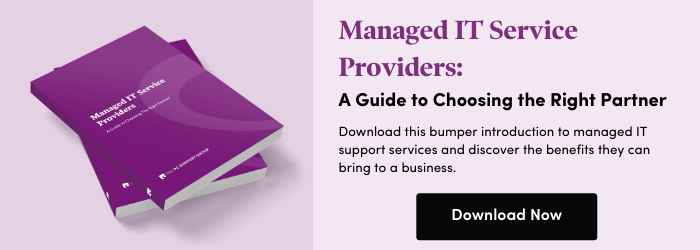
According to a 2018 report, up to 83% of SMEs in the UK use some form of managed services – but there’s often a misunderstanding or confusion surrounding managed IT and what it entails.
What many business owners don’t realise is that good managed service providers can really supercharge an organisation through its provision of support.
In this article, you’ll learn what is meant by the term ‘managed service provider’ or ‘MSP’, as well as what MSPs do and how they can benefit your business.
What is a Managed Service Provider?
A Managed Service Provider (MSP) is a third-party company that manages IT infrastructure for another business (usually on a subscription plan), meaning the SME (small or medium-sized enterprise) can focus on developing their business and the day-to-day IT responsibility lies with the MSP.
The term ‘Managed Service Provider’ is typically shortened to the initialism ‘MSP’. Though this term is used in other industries and circumstances, in IT it always refers to a managed service provider.
What Does a Managed Service Provider Do?
A good MSP will provide a range of IT support services to help support a business from an IT perspective.
For businesses that don’t have the resources and expertise to look after their IT, or simply want to spend time growing their business rather than fixing problems or maintaining IT systems, hiring an MSP is the perfect solution.
Managed IT services can cover a range of functions, including:
- Network management
- Systems and infrastructure maintenance
- Software and hardware setup and maintenance
- Data storage, backup, and recovery
- Cloud service solutions and applications
- Cyber security
- VoIP telephony
- Integrated mobile device connectivity
- Printer management
Often, the MSP will work on these services in the background – meaning the customer or client can focus more effectively on growing their own business.
Some MSPs may focus purely on a particular industry or vertical, while others offer support services across a wider range of industries choosing to focus on how solutions from the likes of Microsoft, Google, And Apple can be applied effectively in a business.
What are the Different Types of Managed Service?
MSPs may offer various levels of IT support to businesses, ranging from fully managed to co-managed and remote only services.
Though each option includes the base levels of support, there are some key differences between the different types.
Here are the main types of managed IT support.
Fully Managed IT Support
For many smaller businesses, a fully managed IT service is ideal. As the name suggests, this level of support means that the MSP is responsible for the entire IT operation, which can have several benefits for a company:
- Saving money on internal salaries plus the HR overhead for IT staff who would otherwise be required
- Increasing and maximising productivity through the best use of the technology and improved uptime
- Reductions in downtime and IT issues through proactive support from the MSP
- Increased protection from cybercrime and malicious attacks
- Business empowerment through the use and implementation of modern technology and systems that are often unknown to or out of the reach of most SMEs
For businesses that need reliable IT support, a fully managed service is an excellent option.
Co-managed IT Support
A halfway house between an internal IT team and an external provider, a co-managed support offering provides a blend of strategic expertise to support existing IT teams. This is particularly useful for slightly larger or growing companies who are looking to accelerate their growth because the safety net of the MSP can provide reassurance while internal IT teams work towards more strategic goals.
Co-managed IT support can provide:
- Increased productivity as the MSP can work on projects even when internal staff are on holiday, sick or tied up on other projects
- Out-of-hours support when internal team members are unavailable
- Reduced pressure on internal IT staff swamped under a flurry of service tickets, enabling them to focus on important strategic work
- Cost savings on full-time employees
For those businesses with existing IT teams at (or close to) full capacity, a co-managed IT solution is a brilliant way to enhance the scale and scope of the IT team without the high costs associated with additional staff and technology.
Server Only Support
Another option to consider is server only support, which an MSP may offer as a Co-Managed IT support option or as an alternative to a fully managed service.
Many IT performance issues, security problems, and even reliability complications can often be traced back to server problems. A server-only support package can provide peace of mind to business owners that their servers are configured, maintained, secured, and backed up effectively.
With a server-only package, the MSP is normally invisible, with engineers keeping a close eye on server performance in the background to maximise efficiency and enhance security. However, should a server issue occur, they will be ready to react and take all necessary actions to bring the system back online as quickly as possible.
Again, this type of support is perfect for those who have an internal IT team that is stretched in terms of time and/or skillset, as it means they can concentrate on the day-to-day IT needs of the business that is within their scope, without worrying about server monitoring.
Why Would a Business Need a Managed Service Provider?
There are many reasons why a small or medium-sized business would consider outsourcing their IT to an MSP. As we’ve already discussed, there are a number of benefits to using a managed IT service provider, and these can often be grouped into business cases such as the following:
Cost Control
With a fixed monthly fee, using a managed IT service can make it easier for smaller businesses to maintain control of their IT costs. Another advantage of an MSP from a financial perspective is the relative affordability when compared with internal hires. Often, good managed services can be as much as half the cost of a full time IT employee – with much more flexibility in terms of support availability – and to effectively cover sickness and holidays a business would require at least two IT staff.
Security
Cyber security is paramount in the connected world, but often this is a grey area for business owners who may not understand the protocols and necessary safeguards to protect data and sensitive information. It can take just a single breach to completely destroy a business, so a managed service provider can provide peace of mind and the comfort blanket of a range of proactive cyber security systems and services to help prevent disaster.
Expertise
Even if a business has an internal IT staff member (or department, depending on company size), they can often be all-rounders rather than specialists in a particular area. This is no bad thing, but a managed service provider can be useful in bridging this knowledge gap. MSPs will have engineers and technicians with a range of skill sets, giving clients access to experts in the IT industry to support their own requirements.
On-demand support
When IT goes wrong, you want a resolution as soon as possible, and preferably even quicker than that. In many cases, IT departments are stretched and it can take time to investigate and diagnose issues before fixes are implemented. And that’s not to mention times when IT staff are out of office, on holiday or sick, or unavailable outside of core hours.
A managed service provider resolves these issues by being on hand whenever you need support with your systems.
Productivity
Slow IT systems, long waits for new hardware, ancient software, ineffective system usage and integration… All of these issues have a damaging effect on a business’s productivity.
But an MSP can help to overcome these by working with the business to maintain systems, security and provide recommendations on beneficial technology. And that means increased productivity for businesses, which can use the time saved to focus on what they do best.
Take a look at this video for a quick overview of how an MSP could benefit your business:
Could Your Business Benefit From Managed IT Support?
Technology is now essential to all businesses, and the speed with which the landscape is changing means it’s more important than ever for companies to keep up. Put simply, businesses can’t afford to be left behind.
As we’ve outlined in this article, a managed IT service provider can bring a host of benefits and advantages to businesses of any size. Could you benefit from outsourcing to an MSP?
Consider some of the following and understand where you could drive additional value from a trusted support provider:
- Are you looking to increase productivity?
- Do you want to save or control IT costs?
- Does your existing IT team need additional support?
- Are you concerned that your IT security may not be adequate?
- Do you need faster and more efficient IT support?
If the answer to any of these questions is ‘yes’, then we think you’d reap the benefits of a managed IT service.
Want to learn more about choosing the perfect partner to deliver stellar IT support? Download our free guide here: Managed IT Service Providers: A Guide to Choosing The Right Partner.

